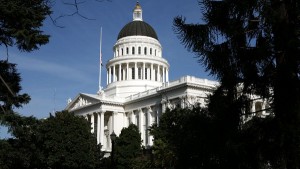Perez Pushes For Rainy Day Fund
Perez also wants to make some long-term changes to California’s budgeting system. During the budget negotiations that will take place over the next month, he said he’ll push to create a new rainy day fund equal to 10 percent of the overall budget. “So that when you have economic downturns in the future, you have the ability to smooth out the impacts,” he explained.
Perez’s plan would use excess capital gains tax revenue to stock the fund. These taxes on stock investments shoot up and down, depending on the economy: They generated $4.1 billion in 2003 and grew to $11.9 billion in 2007, before dropping to just $2.6 billion in 2009.
Perez argued his plan would make the budget process less volatile. When capital gains taxes make up more than 6.5 percent of the state’s budget, his proposal would take the extra money and save it. Then, when California is facing a deficit, lawmakers could dip into the fund. But they wouldn’t be able to use the whole fund at once, he said, “because bad years rarely come by themselves. They usually come a couple years at a time. “
The constitutional amendment, which would require voter approval in 2014, would have generated around $2 billion for a rainy day fund if it had been in place last year.
Brown hasn’t weighed in on Perez’s proposal yet, but his administration has made it clear that extra money should go toward paying down debt. That’s why it hasn’t put money into the existing but ignored rainy day fund created by a 2004 proposition. (Brown’s proposed budget does set aside $1 billion for economic uncertainties, but the money doesn’t go into the Proposition 58-created fund.)
Middle-Class Scholarships
As speaker, Perez sets the agenda in the Assembly, where Democrats control more than two-thirds of the vote. But the Los Angeles Democrat has to balance his budget priorities with those of Brown and Senate President Pro Tem Darrell Steinberg, who have their own proposals.
All three men are pushing different education plans. Perez wants to create state-funded scholarships for students in California’s university system. His proposal would reroute half of the new taxes from the business loopholes closed by last year’s Proposition 39, and use them to cut tuition costs by about $4,000 for families making less than $150,000.
“That would allow us to turn back fees and tuition at UC and CSU to 2008 levels, which would give huge relief to those middle-class families,” Perez said. It’s a more limited version of a plan that passed the Assembly last year, but came up short in the Senate.
Budget negotiations begin in earnest next week, when Brown releases his revised spending plan. After that, Perez and the rest of the Senate and Assembly will have a month to agree on a budget plan, pass it and get it to the governor’s desk.
